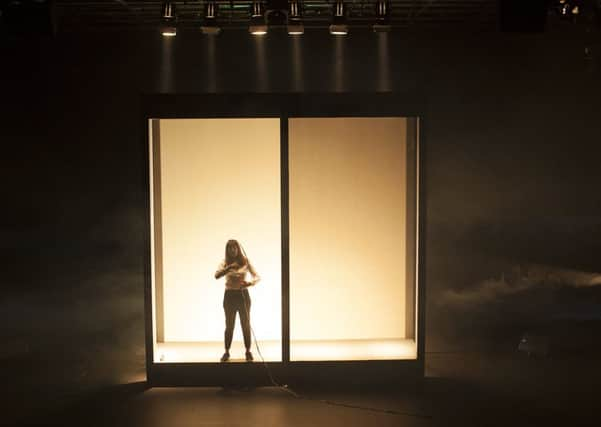Tim Cornwell on Canada Hub, celebrating 150 years of the Federation


Alfred Villeneuve, it turns out, is a French-Polish-Algonquin Canadian artist, drumming out his frustration over 30 oil paintings being stuck in customs at Glasgow Airport the day before his Edinburgh exhibition was due to open at the Scottish Arts Club.
“It was beseeching,” he says. “Being able to drum released a lot of what’s inside, making the connection to the greater part of nature and God, not to fix anything, but to give me the strength whatever happens along the way.” By the morning, it appeared, a solution was close, involving a missing VAT number.
Advertisement
Hide AdAdvertisement
Hide AdVilleneuve’s exhibition is called Tanakiwin: Home and Native Land. Tanakiwin is the Algonquin word for homeland; “home and native land” comes from the Canadian national anthem, mixing the lexicon of coloniser and colonised. “In the anthem people say this is our home and native land, and of course native people have an issue with that,” he said. But he’s firmly not in the business of “victimisation”; his colourful landscapes are informed by modernist Canadian painters and Western art traditions.
Villeneuve is in Edinburgh independently, but across town an even more comprehensively Canadian operation is under way. At King’s Hall, the renovated church that Summerhall has added to its operation, the energetic Canadian producer Michael Rubenfeld is co-ordinating six productions as the Canada Hub – a showcase “celebrating the best of new Canadian theatre, under one roof”. It is backed by the Canada Council for the Arts, and from the country’s £128 million fund for Canada 150, celebrating the 150th birthday of Canadian Federation.
Rubenfeld and his performers hope the shared space will mean shows are supportive and reduce the shared stress of getting reviews, press, audiences.
King’s Hall was also firmly on the map last year with Counting Sheep, the talk of the 2016 Fringe. It used Ukrainian choral song, archive news footage and interactive theatre to thrust the audience into the violent Maidan protests in Kiev. It was produced by Rubenfeld, out of Toronto – home to a large Ukrainian émigré community.
Rubenfeld has gone for cutting-edge topics by leading writers, actors and companies tried and tested by Canadian tours and past visits to the Fringe. Siri is a one-woman show on artificial intelligence, through the relationship between one human and her iPhone. Foreign Radical, already a strong seller, is an interactive take on terrorism politics in the year of the “Muslim Ban”, where a small audience are segregated by questions that categorise them, from how many people slept seven hours the previous night to who might be building a bomb in their suitcase.
The other topic Rubenfeld has chosen to tackle head on, however, is what it means to have a national showcase, this year marking 150 years since the moment when the British colonies of Canada, Nova Scotia and New Brunswick were united in a single Dominion.
“It’s an anniversary and a celebration of 150 years of official governmental ownership,” Rubenfeld says, “over a country that often has been built on the back of colonialism at the expense of almost total annihilation of the indigenous peoples.”
Advertisement
Hide AdAdvertisement
Hide AdA container set at King’s Hall hosts A Refugee Love Story. In it, playwright Hannah Moscovitch, a 29-year-old national “wunderkind”, traces her own Ukrainian and Romanian roots back to her forebears’ arrival at Halifax’s Pier 21, the main immigrants processing point. It was where waves of Scottish, English, Irish and French arrivals in Nova Scotia fed the violent clashes with indigenous dwellers.
In the backstage area, meanwhile, is a space that Rubenfeld sees as pivotal to the whole operation. It is the installation and set for Declaration: Rematriation, an exploration of Indigenous Canadian identity by Article 11, an indigenous performance company. The troupe takes its name from the United Nations Declaration on the Rights of Indigenous Peoples, adopted in 2007. Article 11 enshrines the right to revitalise separate “cultural traditions and customs” through “visual and performing arts and literature”.
“We should hate it here,” says Article 11’s Andy Moro, who has just travelled up from London. “This is like the Great White Mother, where it all started. This is where people rejoiced about the New World and made decisions to invade, and own it, and take it, really.” He is an experienced theatre practitioner with a particular passion for architecture who has fallen in love with Edinburgh’s skyline on sight, but he contrasts the UK’s monumental cities with his own people’s architecture, which “disintegrates back into the earth, the footprint is literally zero.”
Curated by indigenous artists, the show creates an indigenous setting where other Fringe performers can join in. There are “ask an elder” sessions, and a place where people are unafraid to appreciate the power of silence. “We create whatever we feel like doing in that space of time,” Moro says. “We will invite artists who we respect who are of indigenous ancestry or identify strongly, or mixed blood or whatever, working in the indigenous world.”
As part of the process Article 11 is asking prickly questions, including approaching the National Museum of Scotland about the ‘rematriation’ of the remains of a Canadian couple who were the last of their tribe. It will also feature an ongoing installation on the infamous history of residential schools in Canada, to which about 150,000 Inuit, Métis and indigenous children were forcibly removed.
Prominent in this is the figure of Sir John MacDonald, Scottish-born first prime minister of Canada. Indigenous activists recall him as the architect of the Indian Act, which enabled this seizure of children from the their parents. “When the school is on the reserve, the child lives with its parents, who are savages, and though he may learn to read and write, his habits and training mode of thought are Indian,” he is quoted as saying.
For full Canada Hub listings, see: festival17.summerhall.co.uk/ events/canada-hub/